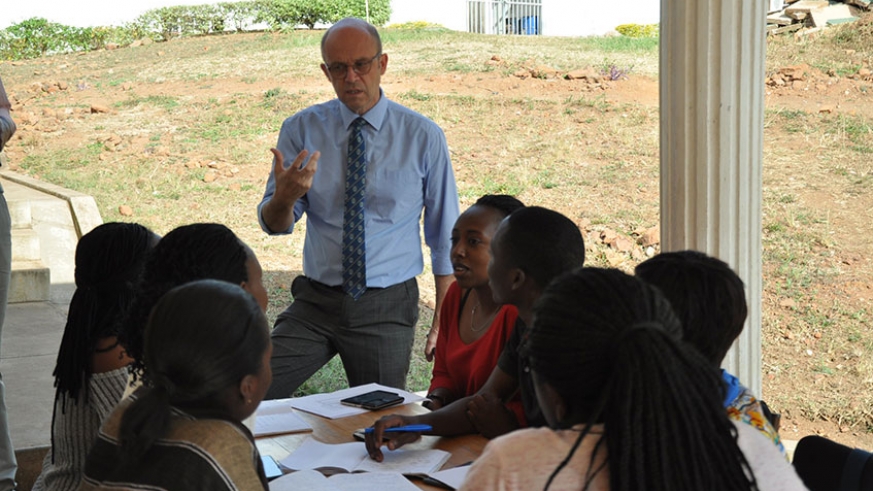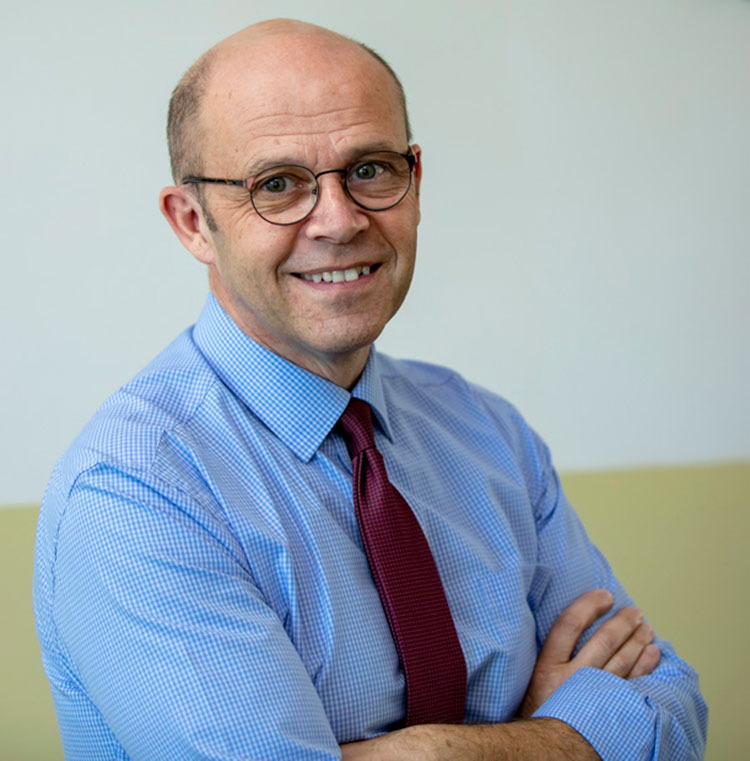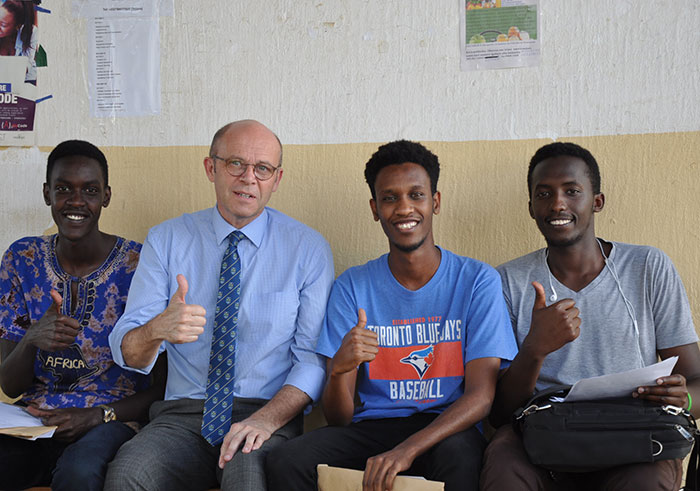
UR-Sweden Symposium showcases innovation-driven solutions to Rwanda’s pressing challenges
- 13-06-2025
- 385

Prof Cotton speaks to a group of students.
Technology is advancing at a fast pace, transforming the way work is done, and universities across the world are key institutions in preparing society for change.
The New Times’ Simon Peter Kaliisa spoke to Professor Philip Cotton, the Vice-Chancellor of University of Rwanda on the ongoing reforms at the institution and its role in helping society cope with emerging challenges.
Excerpts.
You have been in the post for four years now and a lot must have happened, could you share with us some of the changes the University has gone through in this period
A lot has happened and we are happy that there is some progress in some fields all aiming at making University of Rwanda a better place for young people while creating solutions to the problems facing the community.
To achieve this, we had to carry out reforms, try to change how students study and relate with the university by focusing on improving their welfare during the time when they are with us.
We developed really smart ways that would allow to effectively implement these changes without harming any one.
But, we came to realise that to have it smooth, there was a need to first consider the welfare of the staff of the university because however good the policy could be, you may fail to achieve the set targets if you don’t have the minds and hearts of those in the support systems.
So we had to first work on our internal capacity.

What are some of these reforms ?
Most of the reforms have been geared at strengthening our internal capacity to develop policies that would bring the change that we want.
First, we have extended our tuition sponsorship policy to our administration staff who would like to go for a second or third degree. Previously, these benefits were only available to the academic staff.
We have waived off up to 50 per cent of tuition fees to those who are ready and willing to further their studies.
Second, we are planning to establish nursery schools inside our campus to motivate staff members and students with families. This will help them to concentrate on their assignments.
We have introduced a separate internal scholarship programme for students at our Rusizi and Nyagatare campuses. We streamlined our colleges last year.
Considering the busy and highly demanding life people live, we have changed the mode of payment ; students can now pay their tuition fees in instalments.
Lastly, we have also reformed the promotional policy of our own academic staff ; it is now based on the quality of teaching, research and the supervision of graduate students.
I believe that these reforms will help us reshape University of Rwanda.

Prof Cotton with new students ready for the academic year 2019-2020
You must have encountered challenges during the implementation of these reforms…
Challenges are quite many, we had issues with finance, infrastructure, teaching among others. This had an impact on the operations of the university and it was affecting the students’ confidence – which is a key factor in education.
The major problem was finance. We had to look for a solution ; part of the solution was holding ourselves accountable, revising our spending structure. We revisited our expenditure patterns. We could not continue to promote policies or refurbish, infrastructure which reinforces old teaching practices.
Working with other stakeholders, we had to set our spending priorities right and we came up new tuition rates for some programmes so as to increase self-funding capacity.
We have also been working closely with the Education ministry together with the Ministry of Finance and Economic Planning to see how we can stabilise our financial resources.
The ever-changing world threatens the role of universities globally ; what’s the University of Rwanda doing to remain relevant amidst these changes ?
To provide this kind of education, we had to change the way we do things, putting much emphasis on research and dealing with the students’ perception towards education.
We saw that we had to first build confidence in students ; to view education as a tool of transformation.
So what we have been doing is to leverage on recent developments in technology, embedding ICT in our courses, and making teaching and learning very interesting so that students and staff can have a symbiotic relationship.
We are investing a lot in research to build confidence in people who can make the impact we want in our education. It is a key issue for us.
To better utilise the talents of our students, we have streamlined our curriculum to foster project based education because we want the university to be not only a place of learning and understanding concepts but also for practice.
How are you managing the funding of these research projects, given that it’s so demanding in form of financial resources ?
We are now focusing on robust research. This is helping us to compete favourably, internationally, for grant income to finance our research.
We are also considering partnerships with other universities. This is helping us to share costs.
Currently, we are working with three universities — University of Edinburgh, University of Glasgow, and the University of KwaZulu-Natal (South Africa) – on a research project looking at the stigma and prejudice in skin diseases.
Talking about partnership, we do a close scrutiny for a mutual benefit.
With this approach, our university has won competitively quiet a number of Centres of Excellence regionally and continental.
In return this has increased the number of PhD students. This year, we admitted 140 PhD students to these Centres of Excellence.
This intervention has also helped our staff to do internationally recognized research.
So our university will flourish and continue to inspire and give hope to young people who want to excel in life.
There’s now a lot of focus on postgraduate programmes at the university, why ?
We want to see people excelling in life, transforming their communities using their talents and abilities. So we want to provide space where such talents and interesting innovation can flourish. This is the major reason.
To achieve this, for students who are registering their registration will remain active and be able to use it for their second and third degree if they want to advance.
Second the new mode of students paying tuition in instalments has been made available also to those pursuing postgraduate programmes.
To ensure that we produce highly qualified postgraduate students, we increased the level of scrutiny of research proposals, so that students do not conduct research just for graduating.
The research proposals we are looking for are those with power to solve the problems faced by the community, aiming at improving the quality of life.
Lastly, we also see efforts on building a relationship with the Alumni community and you have created a dedicated office for this, is this really important ?
University of Rwanda has over 80,000 alumni staying across the globe and they are experts in their fields. We believe that they can play an important role in lifting the university’s brand but also inspiring the young ones who are just joining us.
We look at them as true ambassadors of the university, so we created a separate office for this aspect because we want to build a strong relationship with them.
We need to engage them more, to start attending different activities being held by the university so as to share stories, experience and expertise to make our beautiful university a source of transformative education.
source :https://www.newtimes.co.rw